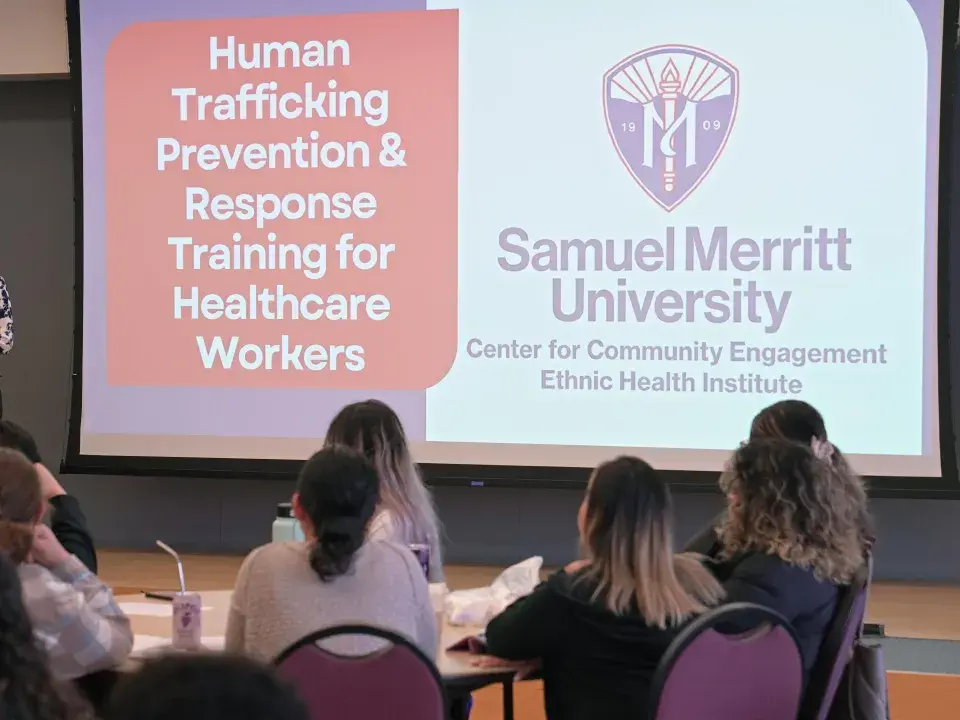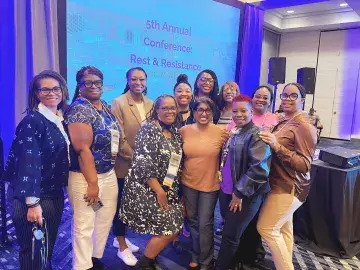SMU Wins Innovations in Professional Nursing Education Award for Human Trafficking Prevention and Response Program

Samuel Merritt University (SMU) has received the Innovations in Professional Nursing Education Award from the American Association of Colleges of Nursing (AACN) for its Human Trafficking Prevention & Response Education Program (HT P.R.E.P.). This national recognition highlights H.T. P.R.E.P.’s impact to re-envision traditional models for nursing education and lead programmatic change by preparing providers to care for human trafficking survivors and those at risk, focused on trauma-informed care.The award-winning project is the result of a collaborative effort led by SMU’s Human Trafficking Task Force, which includes Sam Alavi-Irvine, Tavi Baker, Shelitha Campbell, Jeneva Gularte-Rinaldo, and Sarah Koster.
"This is a collaborative effort and a labor of love for our Human Trafficking Task Force. We are extremely honored to do this work to advance health equity and social justice, while preparing our students, faculty, and healthcare community to be effective change agents,” said Shelitha Campbell, the Nursing Workforce Diversity Program Director and Family Nurse Practitioner.
The HT P.R.E.P. initiative was developed as a collaboration between SMU’s Ethnic Health Institute (EHI) and the College of Nursing in response to findings from a national survey, which revealed that many healthcare providers and students lacked adequate training on human trafficking. Faculty member Sarah Koster identified a training gap while supervising students in clinical placements, which served as a catalyst for this project. This program equips both current and future healthcare professionals with the tools to recognize signs of human trafficking in patients and respond effectively to survivors’ needs, emphasizing systemic understanding, community resources, and compassionate care.
Since its inception in Fall 2022, HT P.R.E.P. has trained hundreds of current and future healthcare workers, equipping them to respond effectively to human trafficking cases. The program has garnered support from educators, clinicians, and community partners. Notably, it has been awarded a $500,000 grant from the Department of Justice to further its mission. Additionally, $150,000 was provided by the MIllicent A. Zaludek Supporting Survivors Scholarship Fund, underscoring the crucial need and value of this effort. The program's sustainability and potential for replication highlight SMU's leadership in driving curriculum change in nursing education.
The training, which is held multiple times a year and primarily housed in Professor Koster’s Community Health class for prelicensure nursing students, is also open to the broader community. The training curriculum consists of information from statewide hospital systems, a presentation from MISSSEY, a local BIPOC and survivor-led trafficking prevention and response organization, real-life case studies, survivor stories, and an expert panel of providers and nonprofit leaders. Additional information about Fall trainings in both Oakland and Sacramento will be announced soon.
HT P.R.E.P. aligns with the American Association of Colleges of Nursing's mission to foster healthcare professionals who can meet the diverse needs of the communities they serve. SMU continues to push the boundaries of nursing education, using this program as a catalyst for change and a model for other health sciences universities to educate a healthcare workforce that is prepared to address pressing public health issues like human trafficking.
Related articles:


